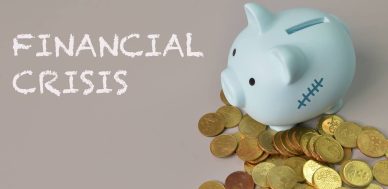As Interest Rates Go Higher, Financial Crisis Becomes a Possibility
The U.S. Federal Reserve has made it very clear that it now wants to raise its benchmark interest rate, the federal funds rate. This could have dire consequences and even lead to a financial crisis.
A little background first.
In late 2020 and early 2021, inflation in the U.S. economy started to pick up speed. The Federal Reserve initially disregarded it and said the inflation was transitory. Sadly, the inflation stuck around, and this led the Fed to act, doing a complete turn on its interest rate policy.
What’s happening now?
In a recent meeting, Federal Reserve officials said they expect to make three interest rate hikes of 25 basis points in 2022, another three hikes in 2023, and two more in 2024. In addition to this, the Fed is planning to reduce its almost-$9.0-trillion balance sheet.
The big investment houses think the Federal Reserve will have to make more rate hikes than that.
Goldman Sachs Group Inc (NYSE:GS) thinks there will be four 25-basis-point increases in the federal funds rate in 2022. (Source: “Goldman Predicts the Fed Will Hike Rates Four Times This Year, More Than Previously Expected,” CNBC, January 10, 2022.)
JPMorgan Chase & Co.‘s (NYSE:JPM) CEO, Jamie Dimon, said he wouldn’t be surprised if there were even more interest rate hikes than that in 2022. In the bank’s post-earnings conference call, he said, “My view is, there’s a pretty good chance there will be more than four — there could be six or seven.” He added, “I grew up in a world where Paul Volcker raised his rates 200 basis points on a Saturday night.” (Source: “JPMorgan CEO Jamie Dimon Says ‘There Could Be 6 or 7’ Interest Rate Hikes,” Yahoo! Finance, January 14, 2022.)
Elephant in the Room That Shouldn’t Be Ignored: Debt
What’s the problem with interest rate increases?
From a soaring-inflation point of view, higher rates are needed and make sense. It’s basic economics, to say the least. However, you can’t ignore the giant elephant in the room: debt—corporate and government. Low interest rates have created an immense surge in debt. It also wouldn’t be wrong to say that low interest rates have even made bad debt look good.
In 2021, $485.1 billion worth of high-yield corporate bonds were issued in the U.S. (Source: “US-Corporate-Bonds-Statistics-SIFMA,” Securities Industry and Financial Markets Association, last accessed January 18, 2022)
These high-yield bonds have another name, junk bonds, and they come with a high risk of default. Junk bond issuance has surged over the past few years. In 2018, $171.3 billion worth of junk bonds were issued. In 2019, this figure was $278.9 billion. In 2020, $423.6 billion worth of junk bonds were issued.
Looking at investment-grade corporate debt, between 2018 and 2021, $5.6 trillion worth of corporate bonds were issued in the U.S.
And looking at the U.S. government debt, it currently stands awfully close to $30.0 trillion. Guess what? This fiscal year, the U.S. government expects interest expenses on its debt of more than $480.0 billion. (Source: “Monthly Treasury Statement,” U.S. Department of the Treasury, last accessed January 18, 2022.)
If Debt Market Faces Headwinds, Could a Financial Crisis Be Avoided?
Dear reader, here’s the reality that very few people are paying attention to: the overall U.S. economy is highly leveraged. Debt has surged.
With this, you have to ask: What will happen to those who hold corporate debt? Interest rates and bond prices are inversely correlated. When interest rates go up, bond prices go lower. As mentioned earlier, the Federal Reserve is expecting eight rate hikes over the next three years. Big banks are expecting at least four hikes this year alone.
If debt investors panic and sell, don’t you think that will impact the overall financial system, and a financial crisis will become a likely scenario? I think it’s possible, so the next few quarters will be very critical to watch.
